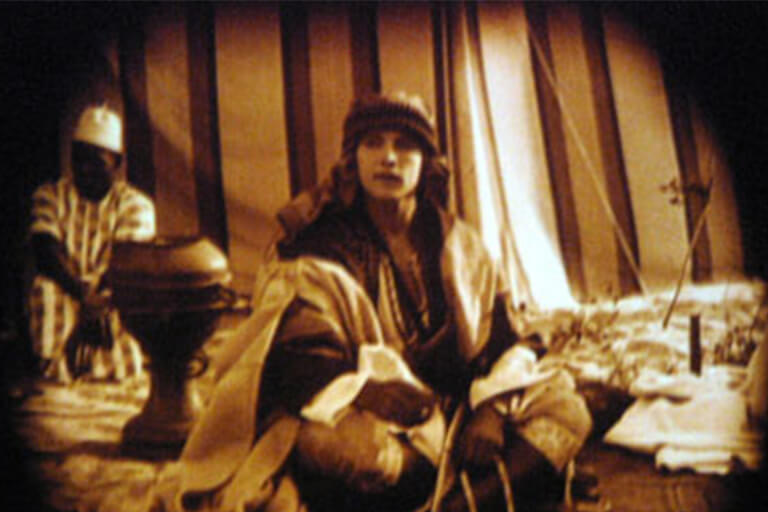Muslim Voices — Cicek Orientalism

Audio transcript:
0:00:06:>>MANAF BASHIR: Welcome to Muslim Voices. I'm your host Manaf Bashir. For as long as there has been film, there have been Muslim bad guys. Whether Rudolph Valentino's swarthy chic or the countless Arabs scattered throughout the Indiana Jones movies, Muslims have been treated as boogeyman. And it's not just films that have done this. TV shows, like "24" or "The Unit," also perpetuate the stereotype of the Muslim felon. For commentator Phyllis Scheck, the treatment of Muslims in film and TV throws up a barrier to intercultural communication between Muslims and non-Muslims. That is, at times, insurmountable.
0:00:48:>>PHYLLIS SCHECK: After the fall of communism, religion has been on the rise and Hollywood has a new boogeyman. The Middle Eastern Muslim terrorist. The mere mentioned of the Middle East and Islam simultaneously conjures up fear and fascination. But Hollywood's depiction of oriental characters as backward, barbaric, yet exotic is nothing new. Over the decades, they have been used in Gregor versus words, as a blank canvas to project the fears and repressed emotions of the Western audiences on the silver screen. In such films like "Chic," "Lawrence of Arabia" and "Indiana Jones." In Lawrence, for example, because the audience cheer an Englishman who saves Arabs who cannot save themselves from the terrible Turks. And we laugh when annoyed Indiana Jones kills an older Arab man with a sword in the market place with a single gunshot as a joke. And there are also the oriental women who do not have agency at all in these films, or when they do, they are either oppressed, or worthless, sexualized or worse. In the recent films, they have become terrorists like their male counterparts and must die. As always, white western male heroes conventionally save them and possibly the world from the oppressive, lustful eastern male villain by physically and metaphorically penetrating the land and culture in such films as "The Road to Morocco" with Bill Crosby and Bob Hope. Such 2001 night's fantasy depiction in Hollywood have changed little over five decades. And now, after 9/11, TV shows like 24 regularly feature Islamic terrorists on their plotlines, and heroes like Jack Bauer have to save the world and Americans over and over again by any means necessary, which usually means capturing, torturing and killing terrorists. The ticking bomb scenario and the evilness of terrorists justify such quasi lawful actions. Liberals, as well as human rights workers, woman and homosexuals are depicted as weak, misguided individuals. Jack Bauer - who is our present day John Wayne - knows best and he will save us all, even from ourselves if need be. Of course, these shows are fictions, and they heighten reality to create more excitement and draw more audiences. But such fiction has the power to shape our perceptions about regions, religions and cultures. And those perceptions come to stand for reality at times, especially when we are not familiar with cultures in question. We tend to accept fiction as fact. The result is this, those who watch such shows could equate Islamic terrorism and nothing else. This is not to say that the 9/11 hijackers were not from the middle eastern countries, Nor to deny the fact that Islam and human rights issues are in conflict in some parts of the present day Muslim worlds and communities. There is much to be improved. For example, women still cannot drive in Saudi Arabia and honor killings are rampant in Pakistan and Turkey. The problem is this, when you reduce an entire region and a religion to terrorism and sexism, you rob entire civilizations of their humanity and therefore undermine the potential for asking legitimate questions about terrorism, religious extremism and sexism. And hence, also undermine the chance of creating progressive dialogue about the topic. At the end of the day, we have to ask ourselves is it really pragmatic to ascribe to the old colonialist view of the Orient and continue to believe, as Kipling did, East is east, and west is west and never the twain shall meet in a global world where what we say or do is heard and responded to around the globe within seconds.
0:04:55:>>MANAF BASHIR: Commentator Phyllis Scheck. Scheck is a movie buff and artist in Bloomington, Ind., where she is also finishing work on her PHD. This has been Muslim Voices, a production of voices and visions in partnership with WFIU public media from Indiana University. Support for Muslim Voices comes from the Social Science Research Council. You can subscribe to our podcast on iTunes or join the discussion on our website. Find us online at MuslimVoices.org.


 IU Global
IU Global